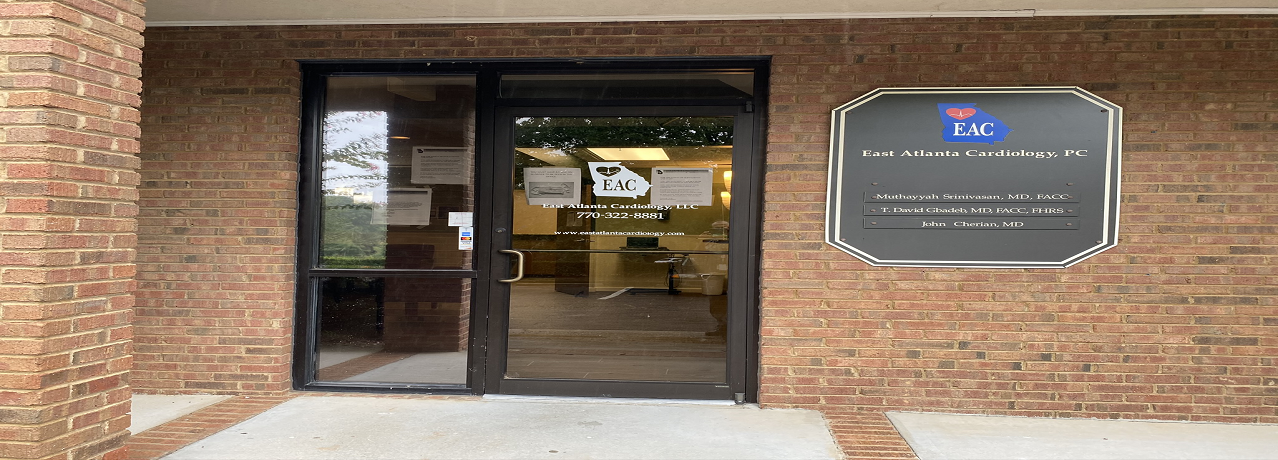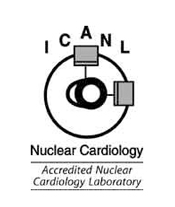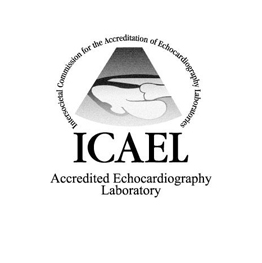

Cardiac catheterization is a procedure done by the Cardiologist using X-ray imaging to look at the inside of the heart´s blood vessels. It is also called a heart cath or cardiac cath. It is done for people who have had a positive stress test or other cardiac test, who have been diagnosed with a heart attack (MI), or who have recurrent chest pain. The procedure is done in an outpatient setting at a hospital. The hospitals that EAC use for cardiac catheterization are Rockdale Medical Center and Dekalb Medical Center.
The procedure is performed by inserting a catheter into the femoral artery through the right or left groin. The hollow catheter is then inserted through the artery until it reaches the heart. The doctor then injects dye through the tube and watches it go through the blood vessels in the heart via special x-ray equipment. Blockages that may be in the arteries are then revealed on the X-ray machine. It also shows the pumping action of the heart and allows the Doctor to diagnose any problems that may be occurring with the heart valves.
1. Do not eat or drink anything after midnight before the test.
2. Often, labs will be drawn before the heart cath to test for anemia, electrolyte problems, and kidney dysfunction.
3. If you are allergic to Iodine or shellfish, notify the Doctor or Nurse. You will be given a prescription for steroids to take the night before and the morning of your heart catheterization to prevent an allergic reaction.
4. Plan to have a family member or friend drive you the day of the test. You will not be allowed to drive home yourself.
5. Bring an overnight bag. If no disease is found in your arteries or no further intervention is needed, you will go home the same day. If further intervention is needed, you will be required to stay overnight.
6. Inform the Doctor if there is any chance of being pregnant.
7. Take your normal blood pressure medications the morning of the test unless otherwise instructed by the Doctor. Bring all other medications with you to the hospital.
8. Do not take GLUCOPHAGE OR METPHORMIN or anything containing this medicine for 2 days prior to the test. This is a diabetes medication. If you are note sure if your medications include glucophage or Metformin, ask the nurse.
A cardiac catheterization can last up to an hour. Before you go into the cath lab, an IV will be started and you will be connected to a heart monitor. A hospital staff member will clean and shave the groin that the cath will be going through. During this time, you will be allowed to have your family members or friends to stay with you.
You will not be put to sleep during this test but you will be given a sedative to help relax you. It is important that you are awake during testing so that you can inform the Doctor if you begin to feel chest pain. You will feel a stinging sensation when the catheter site is anesthetized. Once it is numb, a sheath will be placed at the site and you may feel pressure when this occurs. Cardiac catheterization is not a painful procedure. Some patients describe a flushing sensation when the dye is injected, but you will not feel the catheter moving through your vessels. The catheter will be removed before you exit the cath lab.
If you experience any chest discomfort or pressure, shortness of breath, nausea, itching, dizziness or back pain, you must let the Doctor know.
When the catheter is first pulled out, firm pressure will be applied for 10 to 20 minutes. Often a weighted bag will be put on the site to ensure that there is no bleeding. You must lie flat in a bed for a period of 4 to 6 hours. It is important that you do not bend your leg at the catheter site during this resting period.
Your blood pressure and pulse will be taken frequently after the test and you will be asked to drink plenty of fluids afterward. If you feel pain at the catheter site or notice bleeding at the site, inform the nurse immediately. There will be no stitches at the site.
If you go home the same day, you can move about but do not lift anything or strain yourself. If you notice increased pain at the catheter site, new bleeding, or hardening or warmth of the catheter site, call the Doctor. It is not unusual to have bruising on the inside of the thigh down to the knee, as long as there is no active bleeding.
The Doctor will go over any medication changed before you leave the hospital. Be sure that whoever you are with hears the instructions also because the sedative given during the procedure can cause you to forget things that occur during or right after the procedure. Any other physical restrictions will be given to you at the hospital before you leave. Always call the nurse if you have any concerns or questions.

